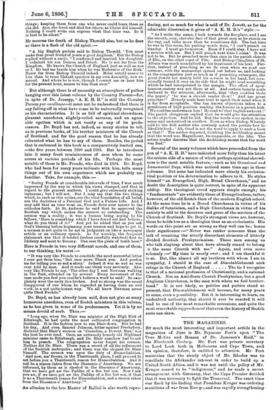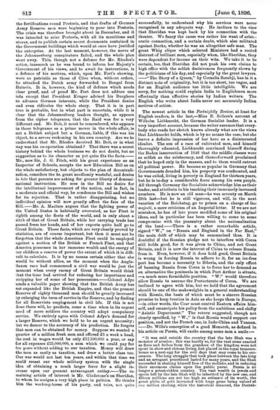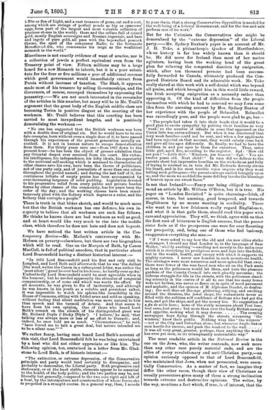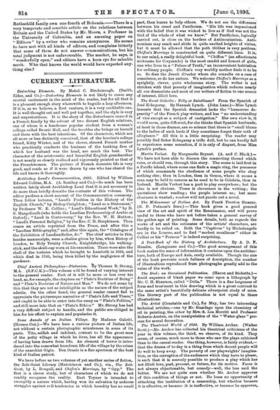THE MAGAZINES.
BY much the most interesting and important article in the magazines of June is Mr. Seymour Fort's upon " The True Motive and Reason of Dr. Jameson's Raid," in the Nineteenth Century. Mr. Fort was private secretary to Lord Loch both in Melbourne and Cape Town, and his opinion, therefore, is entitled to attention. Mr. Fort maintains that the steady object of Mr. Rhodes was to conciliate the Afrikander interest in order to build up United South Africa, and it was not until the policy of Mr. Kruger ceased to be "indigenous," and he made a secret arrangement with Germany, that the Cape Premier decided that it was necessary to fight the Transvaal. The exact time was fixed by his finding that President Kroger was ordering munitions of war from Europa, and was rapidly strengthening
the fortifications round Pretoria, and that drafts of German Army Reserve men were beginning to pour into Pretoria. The crisis was therefore brought about in December, and it was intended to seize Pretoria, with all its munitions and -stores, and to publish certain secret documents contained in the Government buildings which would at once have justified the enterprise. At the last moment, however, the nerve of the Johannesburg conspirators failed, and the whole plan went awry. This, though not a defence for Mr. Rhodes's action, inasmuch as he was bound to inform her Majesty's Government of his views, and to await its instructions, is a defence of his motives, which, upon Mr. Fort's showing, were as patriotic as those of Clive when, without orders, he attacked the Dutch army forwarded to Bengal from Batavia. It is, however, the kind of defence which needs clear proof, and of proof Mr. Fort does not adduce one iota except that President Kruger advised his Burghers to advance German interests, while the President denies and even ridicules the whole story. That it is in part true is probable, but in what part is uncertain, while it is clear that the Johannesburg leaders thought, as appears from the cipher telegrams, that the Raid was for a very different end. Mr. Beit, it must be remembered, who appears in those telegrams as a prime mover in the whole affair, is not a British subject but a German, liable, if this was his object, to a severe reckoning in his own country. Are we to understand that Mr. Rhodes deceived Mr. Beit, or in what way was his co-operation obtained ? That there was a secret history behind the whole business we do not doubt, but no suggestion as to its character as yet quite fits the facts.
Mr., now Sir, J. G. Fitch, with his great experience as an Inspector of Schools, accepts the new Education Bill as on the whole satisfactory, but objects to the plan of decentrali- -Ration, considers the 4s. grant needlessly wasteful, and denies in Coto that parents are asking for greater liberty of denomi- national instruction. He sees in the Bill no desire for the intellectual improvement of the nation, and in fact, in a moderate and official way, he condemns the Bill and wishes for its rejection. That is rather disappointing, but no individual opinion will now greatly affect the fate of the Bill.—Mr. A. Maclure argues that the fighting power of the 'United States is habitually overrated, as her Fleet is eighth among the fleets of the world, and is only about a sixth of that of Great Britain, while her carrying trade has passed from her hands, and of her exports quite half go to Great Britain. These facts, which are very clearly proved by statistics, are of course important, but then it must not be forgotten that the whole American Fleet could be employed against a section of the British or French Fleet, and that America possesses in her immense wealth and the energy of her children a reserve of power the extent of which it is diffi- cult to calculate. It is by no means certain either that she would be without allies, as the moment when the Anglo- -Saxon race had commenced a civil war would be just the moment when every enemy of Great Britain would think that the time had arrived for reducing her importance and stripping her of some of her possessions.--Colonel Adye -sends a valuable paper showing that the British Army has not expanded like the British Empire, and that the present Reserve of eighty thousand men should be greatly increased by enlarging the term of service in the Reserve, and by finding for all Reservists employment in civil life. If this is not lone there will, he predicts, come a time when in its urgent need of more soldiers the country will adopt compulsory service. We entirely agree with Colonel Adye's demand for a larger Reserve, which we hold to be an urgent necessity; but we demur to the accuracy of his prediction. He forgets that men can be obtained for money. Suppose we wanted a quarter of a million fresh men and offered £1 a week a head, the cost in wages would be only £12,500,000 a year, or say for all expenses £25,000,000, a sum which we could pay for ten years without adding to our taxation. Money will draw the men as easily as taxation, and draw a better class too. Our war would not last ten years, and within that time we could recast our whole military system with the single idea of obtaining a much larger force for a slight in- crease upon our present extravagant outlay.—The re- maining article of interest is Mr. Gladstone's on Sheridan, to whom he assigns a very high place in politics. He thinks him the working-horse of his party, and tries, not quite successfully, to understand why his services were never recognised in any adequate way. He inclines to the view that Sheridan was kept back by his connection with the theatre. We fancy the cause was rather his want of aristc cretin connection, and a certain doubt, which also militated against Burke, whether he was an altogether safe man. The great Whig clique which selected Ministers had a rooted distrust of brilliant men, especially when, like Sheridan, they were dependent for income on their wits. We take it to be certain, too, that Sheridan did not push his own claims to high office with the selfish decisiveness frequently shown by the politicians of his day, and especially by the great lawyers.
—" The Story of a Queen," by Cornelia Sorabji, has in it a distinct note of originality, but it is too short, too vague, and for an English audience too little intelligible. We are sorry, for nothing could explain India to Englishmen more
effectually than effective stories by Indian writers. The English who write about India never see accurately Indian motives of action.
The newest article in the Fortnightly Review, at least for English readers, is the last,—Miss E. Sellers's account of
Wilhelm Liebknecht, the German Socialist leader. It is a very imperfect account, because the writer assumes that every- body who reads her sketch knows already what are the views that Liebknecht holds, which is by no means the case, but she
leaves a definite impression of her hero as a disinterested idealist. The son of a race of cultivated men, and himself thoroughly educated, Liebknecht convinced himself during the Baden insurrection of 1848 that the middle classes were as selfish as the aristocracy, and thenceforward proclaimed that he hoped only in the masses, and to them would entrust all political power. He became so popular in Germany that Governments dreaded him, his property was confiscated, and he was exiled, living in poverty in England for thirteen years, but he is to-day a considerable force among his own people. All through Germany the Socialists acknowledge him as their leader, and attribute to his teaching their immensely increased numbers. He is now an old man—he was seventy on March 29th last—but he is still vigorous, and will, in the next vacation of the Reichstag, go to prison on a charge of less majeste, a mere criticism of an Imperial letter. If we are not mistaken, he has of late years modified some of his original ideas, and in particular has been willing to come to some compromise with the peasantry about the nationalisation of the land.—There is a rather remarkable article, signed " W.," on " Russia and England in the Far East," the main drift of which may be summarised thus. It is doubtful if the Russian pledge not to interfere with Corea still holds good, for it was given to China, and not Great Britain, and it is now the interest of China to release Russia from it. Even, however, if it does hold good, Great Britain is wrong in forcing Russia to adhere to it, for an ice-free port has become a necessity to Siberia, and the only effect of banning Russia from Corea is to force her to demand as an alternative the peninsula in which Port Arthur is situate, —a much more formidable position. " W." would therefore allow Russia to assume the Protectorate of Corea. We are inclined to agree with him, but we hold that the agreement should be one of the makeweights in a general understanding with Russia, the basis of which must be a sincere Russian promise to keep treaties in Asia as she keeps them in Europe, —in other words, the Czar must control Eastern affairs him- self, and emancipate his policy from the ambitions and shifty "Asiatic Department." The return suggested, though not clearly specified, by " W.," is that Russia would support our position, and not the French one, in Indo-China and Yunnan.
—Dr. Wills's conception of a good Monarch, as defined in his article on Persia, will excite among some men a smile:— " It was said outside the country that the late Shah was a monster of avarice ; this was hardly so, for the vast sums exacted as fines and bribes from the grandees of the kingdom were not spent in show and riotous living, but placed in the royal treasure- house as a nest-egg for the evil days that may come to his suc- cessors. The long struggle that took place between the late king and an arrogant priesthood lasted for many years, and the Shah succeeded in shaking himself free of the mollabs, and in reducing their enormous claims upon the public purse. Persia is no longer a priest-ridden country. The vast wealth in jewels and specie left by the late Shah will be inherited by the new one, and fifteen millions are not too high an estimate of its worth, the great globe of gold incrusted with huge gems being valued at oce million sterling, while the historical diamond, the Deryah- i-Nfir or Sea of Light, and a vast treasure of gems, cut and nacut, among which are strings of perfect pearls as big as sparrows' eggs, form part of the largest and most valuable collection of precious stones in the world; these and the cellars full of coined gold, mostly English sovereigns and Russian imperials, and bars and ingots of pure gold, all pass with the bejewelled peacock throne, the spoil of the conqueror Nadir, to the fortunate Mozaffer-ed din, who commences his reign as the wealthiest monarch in the world."
Miserliness is not exactly evidence of want of avarice, nor is a collection of jewels a perfect equivalent even from the Treasury point of view. Fifteen millions may be a large hoard for a new Monarch to inherit, but it is a poor substi- tute for the four or five millions a year of additional revenue which good government would immediately extract from Persia without increase of taxation. The Shah, it appears, made most of his treasure by selling Governorships, and the Governors, of course, recouped themselves by oppressing the peasantry.—We are not much interested in the remainder of the articles in this number, but many will be in Mr. Traill's argument that the great body of the English middle class are becoming Tories in positive disgust at the courting of the workmen. Mr. Traill believes that this courting has been carried to moat inexpedient lengths, and is positively demoralising the workman :— " No one has suggested that the British workman was born with a double dose of original sin. But he would have to be sine Labs concept us, born without even a single dose of it, to have passed through his experiences of the present generation morally un scathed. It is not in human nature to escape demoralisation from them. For thirty years save one—from 1867 down to the present hour—he has been the object of grosser adulation than any Oriental despot ever received from his court. His virtue, his intelligence, his independence, his lofty ideals, his superiority to the sectional self-seeking which is assumed to characterise all other classes save his own, have been the theme of politicians, not of one party only, and of journalists of more than one colour throughout the period named ; and during the last half of it, the continuous tribute of empty praise has been accompanied by ever-increasing largesses of solid pudding. Legislation devoted to his progressive relief from every public and private burden borne by other classes of the community, has for years been the order of the day; and the working classes have been simul- taneously plied with the flattery which depraves a ruler, and the bribery that corrupts a people."
There is truth in that bitter sketch, and would be much more but that the British workman has one defence, his own in- capacity to believe that all workmen are such fine fellows. He thinks he knows there are bad workmen as well as good, and at heart would like very much to rise into the middle class, which therefore he does not hate and does not boycott.
We have noticed the best written article in the Con- temporary Review—Mr. Mallock's controversy with Mr. Hobson on poverty—elsewhere, but there are two biographies which will be read. One on the Marquis of Bath, by Canon MacColl, is full of political anecdote, that in particular about Lord Beaconsfield having a distinct historical interest:—
"In 1875 Lord Beaconsfield paid his first and only visit to Longleat, and Lord Bath said afterwards that be was the dullest [the word, writes the Canon in a subsequent letter, was rather the ' most silent'] guest he ever had in his house ; he hardly ever spoke.' Undoubtedly Lord Beaconsfield could be most agreeable when in the humour; but he needed apparently the stimulus of congenial 'companionship, or of some end which was worth the effort. By all accounts, he was given to fits of taciturnity, and although he was known in his youth as a voluble and persistent talker, it was impossible to watch his sphinx-like immobility in the House of Commons, sitting with folded arms and seldom speaking, without feeling that silent meditation was more natural to him than speech and the turmoi1 of debate. And that seems to 'have been his own opinion„- One of those who heard Lord Bath's remark on the silen64 of his distinguished guest was
Mr. Richard Doyle (' Dicky I believe,' be said, that talking was always more or less of an effort to Disraeli ; and, indeed, he once told use as much. "Circumstances," he said, "have forced me to talk a great deal, but nature intended me to be a silent man."'"
We rather fancy, having once heard Lord Bath's account of this visit, that Lord Beaconsfield felt he was being entertained by a host who did not either appreciate or like him. The following opinion, too, contained in a. letter from Mr. Glad- stone to Lord Bath, is of historic interest :—
" The extinction, or extreme depression, of the Conservative principle and party would tend certainly to disorganise, and probably to demoralise, the Liberal party. Bath progressive and stationary, or at the least stable, elements appear to be essential to the health of the body politic ; and the two parties may be, not literally but generally, compared to the two oars right and left of a boat, by the intermixture and counteraction of whose forces she is propelled in a straight course. In a general way, then, I accede
to your thesis, that a strong Conservative Opposition is needed for the well-being of a Liberal Government, and for the due and safe perform ince of its work."
But for the Unionists the Conservatives also might be demoralised by the "extreme depression" of the Liberal party.—Mr. Sydney Buxton's paper is an account of Mr. J. H. Tuke, a philanthropic Quaker of Hertfordshire, s hue history is far less widely known than it should be. He did more for Ireland than moat of her native agitators, having been the working head of the great plan for relieving the congested districts by emigration, which, after ten thousand persons bad been success- fully forwarded to Canada, ultimately produced the Con- gested Districts Board and its admirable work. Mr. Tuke really slaved at this work with a self-denial which was beyond all praise, and which brought him in this world little reward, the Irish accepting emigration as a necessity rather than approving it. Of the kind of difficulties from the people themselves with which he had to contend we may form some idea from the amusing account by Mrs. Sydney Buxton of her experience with the people of Belmullet. Belmullet was exceedingly poor, and the people were glad to go, but— "The people had taken it into their beads that it would be a good plan to excite sympathy by putting their families as very weak,' so the number of infants in arms that appeared on the Union lists was extraordinary. But when it was discovered that very weak families could not be sent, and when a few applicants had been rejected on that account, they would calmly come back and give all the ages differently. So, finally, wo had to have the children in and put ages to them for ourselves. Thus, enter little girl, aged five, according to the register. Syd : ' How old are you ? '—Little Girl : ' Nineteen, yer houour.'—Syd: ' You are twelve years old. Next child ! ' In vain did we deliver to the parents short but impressive homilies on the wickedness and folly of trying to mislead us, in vain did Mr. Richards fiercely stroke his beard, and in his most terrible voice inquire why they went telling such golleogues—the parents always smiled benignly upon us, and the more we scolded the more did they invoke the blessings of heaven upon our sweet faces."
Is not that Ireland P—Fancy our being obliged to recom- mend an article by Mr. William O'Brien, but it is true. His paper on "London Revisited" is quite charming—Irish, of course, in tone, but amusing, good tempered, and towards Englishmen by no means wanting in cordiality. Those who want to see how Irishmen really regard Englishmen, and what it is that galls them, should read this paper with care and appreciation. They will, we think, agree with us that the first root of bitterness is English success, that the poorer sister feels as if the prosperous one were for ever flaunting her prosperity, and, being one of those who feel iealonsy, exaggerates everything she sees :— " If I were asked to say how the old and the new cities strike a stranger, I should say that London is, in the language of Sam Weller, ' wiribly swelling '—swelling not merely in the miles over which it is stretching its prodigious arms and legs into the fields, but in the wealth, health, and energy with which it supports its mighty carcase. I never saw London in such monstrous health. The carriages were more numerous and more splendid than ever; there were fewer of the wan-faced men who sit on the Park seats as long as the policemen would let them, and turn the pleasure gardens of the County Council into such ghastly sarcasms; the hideous struggle for life in the streets, with the policeman stand- ing solemnly in the centre of it all to see that too many bones were not broken, was never so fierce or, in spite of wood pavement and asphalts, and the opinion of M. Alphonse Daudet, so deafen- ing ; the well dressed throngs glittering, eddying, and swelling around the theatres, the jewel shops, the restaurants never so filled with the sublime self confidence of Britons who had got the men, and got the ships, and got the money too. No suggestion of afin de Was here ; none of the sickly nonsense about Tout lane, tout casse, tout passe; but more than ever the burly British energy and appetite, seeking what it may devour The evening newspaper boys flying through the streets screaming ' the winners,' know their public. Nothing wins like the winners' —not at the City and Suburban alone, but wherever Anglo Saxon
men hustle for success, and push the weakest to the wall It was all very great, greater, perhaps, than anything the world has ever yet seen, in its triumphantly materialistic! way."
The most readable article in the National Review is the one on the Jews, who, the writer contends, now seek more than any other race purely material ends, and are the allies of every revolutionary and anti-Christian party,—an opinion curiously opposed to that of Lord Beaconsfield, who maintained that Jews, when not persecuted, were essen- tially Conservative. As a matter of fact, we imagine they differ like other races, though their view of Christians as usually persecutors gives many of them a strong inclination towards extreme and destructive opinions. The writer, by the way, mentions a fact which, if true, is of interest, that the
Rothschild family own one-fourth of Bohemia.—There is a very temperate and sensible article on the relations between Britain and the United States by Mr. Moore, a Professor in the University of Columbia, and an amusing paper on Editors " by a writer who remains anonymous. He seems to have met with all kinds of editors, and complains bitterly that some of them do not answer communications, but his total judgment is not unfavourable. The market, he says, is "wonderfully open," and editors have a keen eye for saleable merit. Who that knows the world would have expected any- thing else ?









































 Previous page
Previous page